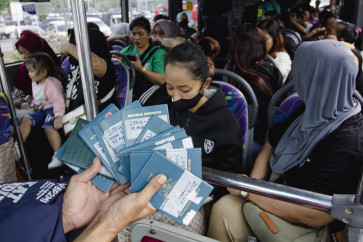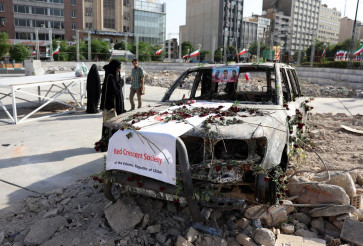Popular Reads
Top Results
Can't find what you're looking for?
View all search resultsPopular Reads
Top Results
Can't find what you're looking for?
View all search resultsNumber of people with HIV/AIDS increasing in C. Java
The number of housewives and children detected to have been living with HIV/AIDS in the province of Central Java has been increasingly for the last few years
Change text size
Gift Premium Articles
to Anyone

T
he number of housewives and children detected to have been living with HIV/AIDS in the province of Central Java has been increasingly for the last few years.
Executive director of the Indonesian Family Planning Association’s (PKBI) Central Java branch, Elisabet SA Widyastuti, said that 97 housewives were found to be infected by HIV/AIDS from 1993 to 2008 before the figure sharply increased to 332 as of September 2011.
The cases among children has also shown the same trend, from only two in 2008 to 68 as of the same period.
They are mostly infected from their mothers at birth, Elisabet said.
Nationwide, data at the AIDS Protection Commission (KPA) showed that the percentage of new AIDS cases in women increased from 16.9 percent in 2006 to 35.1 percent in 2011.
The percentage of babies infected by their mothers, similarly, increased from 2.2 percent in 2006 to 4.7 percent in 2011.
“Seen from the proportion, those infected are mostly people in their productive ages of between 20 and 29 years old. These are the [age] groups that most probably get married and have kids,” Elisabet said in Semarang, Thursday.
Because of this new trend, she said, a change in the strategy of dealing with the disease was needed. If previously the strategy was focused more on commercial sex workers, it now had to focus more on commercial sex customers and housewives.
Quoting data from the Health Ministry, she said that men were more likely to infect others, including their wives and children.
The data at the ministry showed that 3.1 million adult men had been customers of commercial sex workers while some 1.6 million women had married infected men, while the number of infected commercial sex workers was 320,000.
She also expressed concern that while attention was focused more on commercial sex workers, infected housewives and children were not accounted for.
“In fact, they have been stigmatized as the burden of the family and society, not mentioning the discrimination that they receive from their family, school and society,” Elisabet said.
Program manager of Harm Reduction Semarang Hasnul Fauzi said that there had been high awareness among drug users not to share needles that had proved to be significant in controlling infection rate among them.
However, he added, there had not yet been any mechanism to help commercial sex customers aware of the importance of to protecting their families from HIV/AIDS infection.
PKBI Central Java’s HIV/AIDS and child project coordinator, Esti Budi Utami, said that to help deal with the problem, the association had been providing supervision to children with HIV/AIDS in Grobogan and Jepara regencies since 2010.









